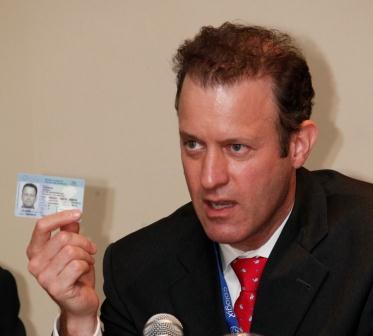
TORONTO – Easing Canadians’ minds about security concerns over mobile payments continues to be a major challenge for the mobile commerce industry, according to a panel of industry experts who spoke Monday morning at the Canadian Telecom Summit in Toronto.
Recent research by credit insurance provider Assurant Solutions indicates 38% of global survey respondents are very concerned about security when conducting financial transactions through a mobile device, said Zack Fuerstenberg, vice-president of product innovation for Assurant Solutions Canada. “About half (of survey respondents) are concerned about people gaining unauthorized access to their bank account details,” he said. Other key concerns cited by respondents include identity theft and unauthorized access to passwords and personal funds.
“Those perceptions are very much present and really represent a barrier to adoption,” Fuerstenberg explained, adding that, when compared to global survey responses, Canadian participants were even more risk averse to doing mobile transactions. “Part of that is a function of them not having done it yet. They haven’t adopted these things at this point in time.”
David Robinson, vice-president of emerging business for Rogers Communications, said mobile wallet technology is actually more secure than a traditional, physical wallet, but if consumers believe otherwise, then it’s a problem for retailers and marketers. “Whether (consumers’ concerns) are legitimate or not, doesn’t matter. If they believe it’s a problem, then it’s a problem,” he said.
Two features that make mobile wallets more secure than physical wallets are the ability to lock a smartphone and the PIN required to open the payment application. Furthermore, most of the mobile payment cards, such as those issued by Visa or MasterCard, would provide zero liability to consumers. “So even if it was hacked, you’re not liable for it,” Robinson said.
Plus, mobile wallet security technology uses 2048-bit encryption, which could be cracked in theory, but would be very difficult. “Fraudsters are business people really, so it comes down to it’s just not worth their time,” Robinson said.

Eric Morris, head of mobile advertising for Google Canada, raised a serious technical concern mobile users will have about using their smartphones to shop. “It may sound trivial, but what if my phone battery dies? That is a practical concern,” Morris said. “If everything is in my phone, then I can’t buy anything.”
“The likelihood is you’re going to continue for my lifetime having physical wallets, probably with fewer cards, and mobile wallets will have copies (of those cards),” Robinson (right) responded.
Anik Sane, vice-president of IT strategy and solutioning for Tech Mahindra, said consumers will need some type of incentive to use mobile payment technologies, too. “Think about going to Shoppers Drug Mart today, and really arguing: ‘Why would I, at that store, whip out my cell phone instead of my wallet?’” Sane asked.
“The answer has to be that you will combine not only the payment, but you’ll combine my loyalty card, and you’ll combine the fact that after I spend $50 there, you’ll give me a $10 coupon,” Sane said. And, by simplifying check-out procedures, retailers will provide a level of convenience to consumers that they don’t currently have, Sane said.
Photo by Pinpoint National Photography



